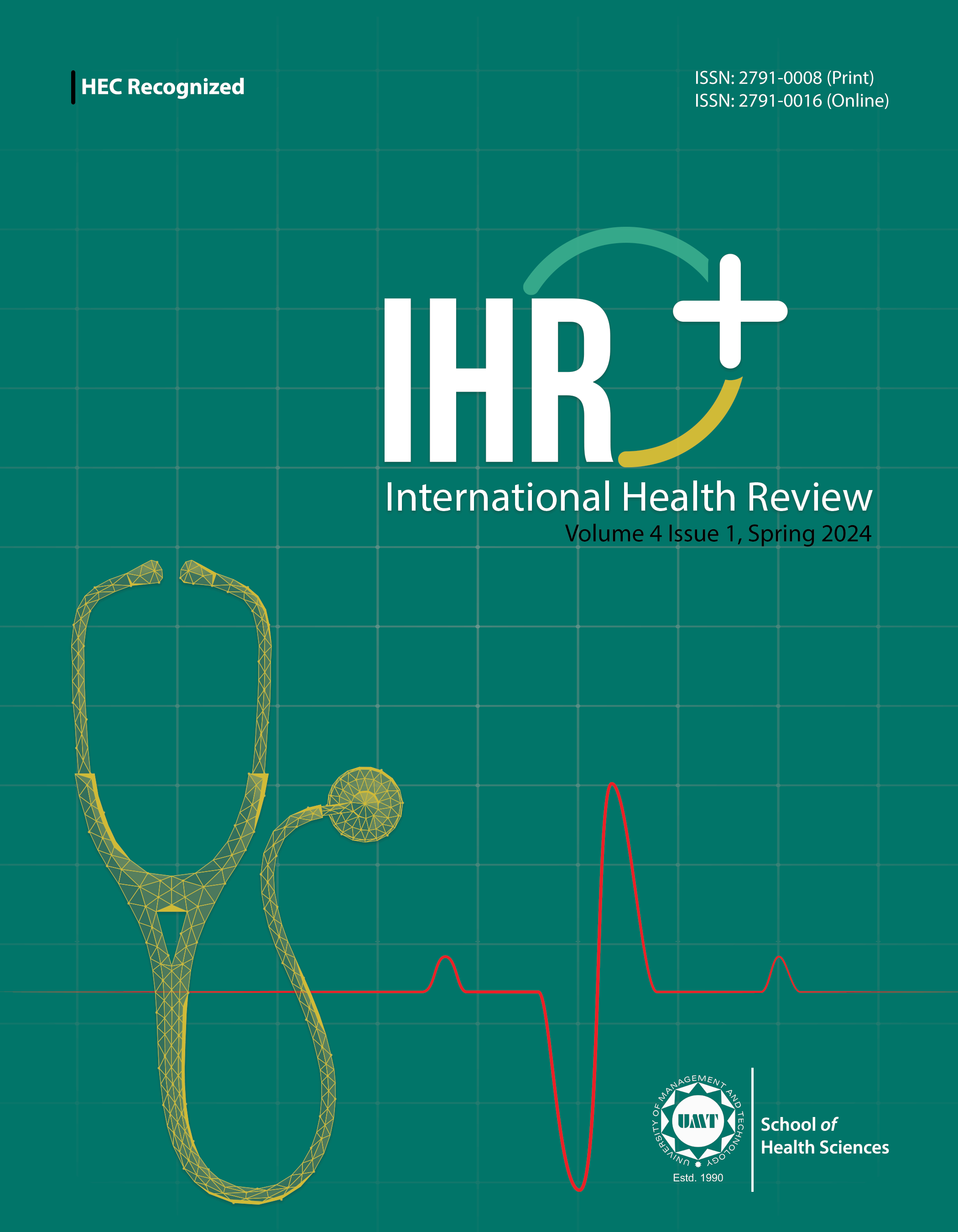Evaluation of Hepatoprotective and Nephroprotective Impact of Phytomedicine using Experimental Animal Models
Abstract
 Abstract Views: 0
Abstract Views: 0
Human beings have been using plants as medicines for centuries. The development of traditional medicinal systems utilizing plants as a form of medicine may be traced back only as far as historical documentation of their similarity. Immunosuppression and bone resorption is a major drawback in conventional chemotherapy. Modern medicines contain plant-derived components that are the source of immunomodulators. Withania somnifera and Cnidium monnieri are the plants which have been used for immunomodulatory and anti-osteoporotic activities. Medicinal plant samples were obtained from diverse parts of Pakistan. Following extraction, phytochemical analysis and antimicrobial potential were investigated, and the hepatoprotective effect was evaluated. An in vivo study was conducted on experimental animals by administering ethnomedicinal plant extracts in comparison to some allopathic drugs. Various blood samples were collected to analyze calcium level, vitamin-D, thyroid-stimulating hormone (TSH), parathyroid hormone (PTH), follicle stimulating hormone (FSH), and Testosterone for antiosteoporosis activity. The possible outcomes were positive and hepatoprotective as well as antimicrobial effect was present in Polyherbal preparation (PHP). During trails on Albino rats, the improvement in their body weight was recorded. PHP administration of plant extracts enhanced the parameters of blood and neutralized the effect of CCl4 intoxication. The proper administration of plant extracts showed a positive effect on hormones, particularly progesterone, testosterone, and oestradiol. In the future, these selected medicinal plants and their PHP might be preferred for the separation of lead bioactive compounds to overcome the extremely alleviating issues associated with infertility.
Downloads
References
Hardie J. Hormones and reproduction. In: Leather SR, ed. Insect Reproduction. CRC Press; 2018:95–108.
Hamilton KJ, Hewitt SC, Arao Y, Korach KS. Estrogen hormone biology. Curr Top Dev Bio. 2017;125:109–46. https://doi.org/10.1016/bs.ctdb.2016.12.005
Rooney KL, Domar AD. The relationship between stress and infertility. Dialogues Clin Neurosci. 2018;20(1):41–47. https://doi.org/10.31887/DCNS.2018.20.1/klrooney
Hanson B, Johnstone E, Dorais J, Silver B, Peterson CM, Hotaling J. Female infertility, infertility-associated diagnoses, and comorbidities: a review. J Assist Reprod Genet. 2017;34:167–77. https://doi.org/10.1007/s10815-016-0836-8
Stellar C, Garcia-Moreno C, Temmerman M, van der Poel S. A systematic review and narrative report of the relationship between infertility, subfertility, and intimate partner violence. Int J Gynaecol Obstet. 2016;133(1):3–8. https://doi.org/10.1016/j.ijgo.2015.08.012
Rishi G, Subramaniam VN. The liver in regulation of iron homeostasis. Am J Physiol Gastrointest Liver Physiol. 2017;313(3):G157–G165. https://doi.org/10.1152/ajpgi.00004.2017
Tripathi A, Debelius J, Brenner DA, et al. The gut–liver axis and the intersection with the microbiome. Nat Rev Gastroenterol Hepatol. 2018;15(7):397–411. https://doi.org/10.1038/s41575-018-0011-z
Andrade RJ, Chalasani N, Björnsson ES, et al. Drug-induced liver injury. Nat Rev Dis Primers. 2019;5(1):e58. https://doi.org/10.1038/s41572-019-0105-0
Perumpail BJ, Khan MA, Yoo ER, Cholankeril G, Kim D, Ahmed A. Clinical epidemiology and disease burden of nonalcoholic fatty liver disease. World J Gastroenterol. 2017;23(47):8263–8276. https://doi.org/10.3748%2Fwjg.v23.i47.8263
Liss KH, Finck BN. PPARs and nonalcoholic fatty liver disease. Biochimie. 2017;136:65–74. https://doi.org/10.1016/j.biochi.2016.11.009
Mohamed F, Jean-Marc D, Stephane A, et al. Therapeutic approach out of IVF of ovulation disorders in Sub-Saharian African. Open J Obstet Gynecol. 2017;7(11):1116–1123. https://doi.org/10.4236/ojog.2017.711112
Khan T, Ali M, Khan A, et al. Anticancer plants: a review of the active phytochemicals, applications in animal models, and regulatory aspects. Biomolecules. 2019;10(1):e47. https://doi.org/10.3390/biom10010047
Nerdy N, Ritarwan K. Hepatoprotective activity and nephroprotective activity of peel extract from three varieties of the passion fruit (Passiflora sp.) in the albino rat. Open Access Maced J Med Sci. 2019;7(4):536–542. https://doi.org/10.3889%2Foamjms.2019.153
Hudaib MM, Tawaha KA, Mohammad MK, et al. Xanthine oxidase inhibitory activity of the methanolic extracts of selected Jordanian medicinal plants. Pharmacogn Mag. 2011;7(28):320–324. https://doi.org/10.4103%2F0973-1296.90413
Jain A, Ranade R, Pritam P, Joshi N, Vavilala SL, Jain A. A comparative study of antioxidant activity, total phenolic and flavonoid contents in different parts of Helicteres isora L. Am J Life Sci. 2014;2(5):292–302.
Neupane P, Lamichhane J. Estimation of total phenolic content, total flavonoid content and antioxidant capacities of five medicinal plants from Nepal. Vegetos. 2020;33:360–366. https://doi.org/10.1007/s42535-020-00116-7
Zhang A, Sun H, Yan G, Wang X. Recent developments and emerging trends of mass spectrometry for herbal ingredients analysis. Trends Analyt Chem. 2017;94:70–76. https://doi.org/10.1016/j.trac.2017.07.007
Montgomery DC. Design and Analysis of Experiments. Wiley; 2017.
Chaphalkar R, Apte KG, Talekar Y, Ojha SK, Nandave M. Antioxidants of Phyllanthus emblica L. Bark extract provide hepatoprotection against ethanol-induced hepatic damage: a comparison with silymarin. Oxid Med Cell Longev. 2017;2017:e3876040. https://doi.org/10.1155/2017/3876040
Tungmunnithum D, Thongboonyou A, Pholboon A, Yangsabai A. Flavonoids and other phenolic compounds from medicinal plants for pharmaceutical and medical aspects: an overview. Medicines. 2018;5(3):e93. https://doi.org/10.3390/medicines5030093
Sheoran S, Nidhi P, Kumar V, et al. Altitudinal variation in gallic acid content in fruits of Phyllanthus emblica L. and its correlation with antioxidant and antimicrobial activity. Vegetos. 2019;32:387–396. https://doi.org/10.1007/s42535-019-00048-x
Anto EJ, Syahputra RA, Silitonga HA, Situmorang PC, Nugaraha SE. Oral acute toxicity study extract ethanol of balakka fruit (Phyllanthus emblica). Pharmacia. 2022;69(1):187–194.
Naz M, Abbas N. Study of Hepatoprotective effect produced by the fruits of Phyllanthus emblicus and silymarin against cisplatin induced hepatotoxicity. Br J Pharm Res. 2016;10(6):1–7. https://doi.org/10.9734/BJPR/2016/22904
Li L, Mo F, Hui EP, et al. The association of liver function and quality of life of patients with liver cancer. BMC Gastroenterol. 2019;2019:e66. https://doi.org/10.1186/s12876-019-0984-2
Kerdput V, Pradidarcheep W. Effects Of Hua-Khao-Yen Extract (Dioscorea Membranacea Pierre) In Hepatocellular Carcinoma-Induced Rat [dissertation]. Bangkok: Srinakharinwirot University; 2020.
Copyright (c) 2024 Muhammad Jahangeer, Humayun Ameen, Ghazia Fatema , Muti Ur Rehman, Shaista Nawaz, Kashaf Tariq, Shamma Firdous, Shafqat Munir, Muhammad Hassan Farooq, Afifa Maryam, Areej Riasat

This work is licensed under a Creative Commons Attribution 4.0 International License.






